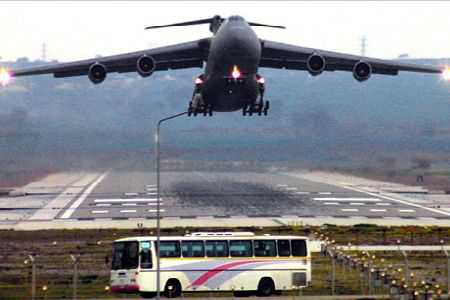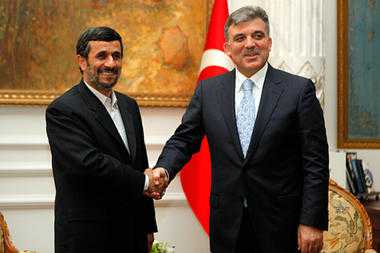Michael Theodoulou
Last Updated: Dec 20, 2010
The Iranian government has suddenly adopted an unusually emollient tone in addressing its nuclear dispute with world powers, while also voicing the desire to improve relations with key countries in the region and beyond.
Mahmoud Ahmadinejad, Iran’s hardline president, said he hoped for a “win-win” outcome from discussions with the five permanent members of the United Nations Security Council and Germany, the so-called P5+1.
Iran’s charm offensive was launched on Saturday by Mr Ahmadinejad and his new caretaker foreign minister, Ali Akbar Salehi, a US-educated nuclear scientist who is fluent in English and Arabic.
Some analysts suspect Tehran may be prepared to curb parts of its nuclear programme in exchange for an end to punitive sanctions that, US officials insist, are hurting Iran far harder than it cares to admit.
The key to any deal is that Iran is allowed to continue enriching uranium for peaceful purposes, but under enhanced international supervision: a scenario Hillary Clinton, the US Secretary of State, raised recently.
On the home front, however, a sour note was struck yesterday by Mr Salehi’s long-serving predecessor, Manouchehr Mottaki, who was on an official visit to Senegal when he was unceremoniously fired by the president last Monday.
“Sacking a minister while (he is) on a mission is unIslamic, undiplomatic, offensive and outside the practices of politics,” Mr Mottaki fumed.
Ignoring such criticism, Mr Ahmadinejad appears focused instead on the high-stakes talks over Iran’s nuclear programme with global powers.
Those talks, which resumed earlier this month in Geneva after a hiatus of more than a year, are due to continue in Istanbul, Turkey, at the end of January.
Speaking in a live interview with state television late on Saturday night, the Iranian president said he hoped all parties could emerge with their “dignity and reputation” intact. The Geneva talks, he said, had been “positive”.
Mr Ahmadinejad called for international sanctions against Iran to be lifted and to turn the “policy of confrontation” into one of co-operation”. He said: “If we move toward interaction it’s a win-win situation. There will be no loser. We want everyone to be a winner from the very beginning.”
The Iranian president suggested that, after Istanbul, further talks could be held in Brazil which, like Turkey, voted against imposing the latest set of UN Security Council sanctions against Iran in June. And, after Brazil, negotiations could move to Tehran itself.
Mr Ahmadinejad’s conciliatory words came hours after Mr Salehi took office in a ceremony that was also intended as a farewell gathering for Mr Mottaki – who snubbed the event.
Mr Salehi, who is still head of Iran’s Atomic Energy Agency, used his address to send friendly signals to many countries.
He talked of the need for cooperation with Saudi Arabia, whose concerns about Iran’s nuclear programme were highlighted in a US cable released recently by the WikiLeaks website. Working together, Iran and Saudi Arabia could “solve the problems of the region and the world of Islam”, Mr Salehi said.
Commentary:
Washington can bide its time on Tehran’s nuclear ambition
Last Updated:Dec 20, 2010
US and Israeli advocates of bombing Iran’s nuclear facilities may have claimed vindication when WikiLeaks cables revealed that some Arab regimes were singing the same tune behind closed doors, but that doesn’t make military action any more likely.
TONY KARON
Meanwhile Turkey, he added, shares cultural and ideological ties with Iran that make them natural partners. And relations with Russia and China, which disappointed Iran by backing Washington’s push for a fourth round of sanctions, require “special political attention”.
Mr Salehi also offered an olive branch to the 27-nation European Union, which earlier this year angered Iran by imposing new sanctions.
“If the EU speedily transforms its confrontational style into positive interaction, it would be in the interests of both parties,” he said.
The energy-hungry EU, he implied, could not afford to ignore his country’s huge oil and gas reserves. Mr Salehi did not, however, address Iran’s relations with the US.
Iran’s conciliatory new diplomatic tone may also be aimed at reassuring jittery Iranians that their government is doing its best to stave off further international sanctions at a time when many are concerned about rising prices because of its government’s programme to slash subsidies on fuel and food, which went into effect yesterday.
Washington, meanwhile, has been attempting to drum up regional support against Iran’s nuclear programme. In Bahrain, Admiral Michael G Mullen, chairman of the US Joint Chiefs of Staff, met on Friday night with the island nation’s king, Hamad bin Isa Khalifia.
“From my perspective, I see Iran continuing down the path to developing nuclear weapons,” Mr Mullen asserted.
Military strikes on Iran’s nuclear facilities, he added, would be “destabilising”. A “regional approach” and dialogue with Tehran was needed, Mr Mullen said. But, he insisted: “All options have been on the table and remain on the table.”
[email protected]




